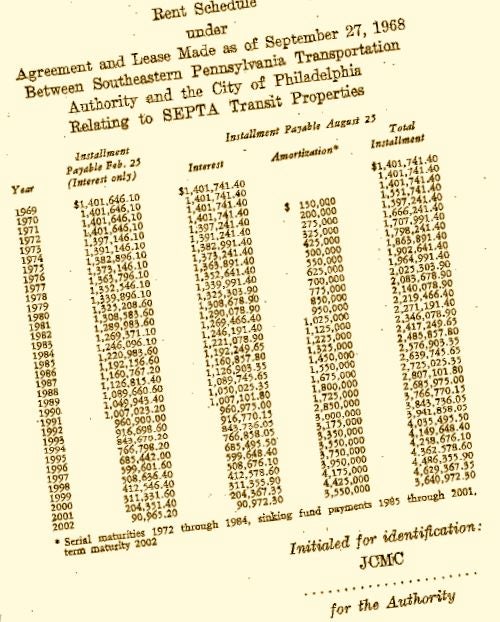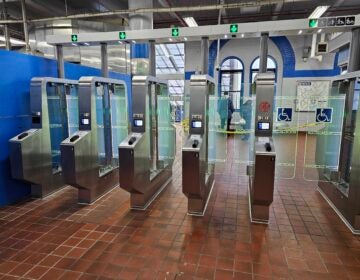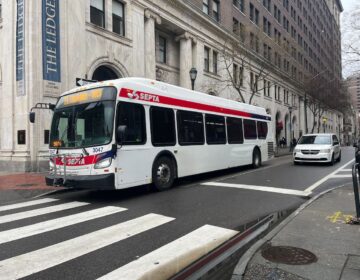Council authorizes hearings on City’s lease agreement with SEPTA

Members of City Council approved a resolution Thursday morning which authorizes the Committee on Appropriations to hold hearings looking into the City’s lease agreement with SEPTA. The resolution was introduced by Councilman At-Large Wilson Goode, Jr., and passed without opposition.
The terms of the original lease-leaseback agreement*, which was signed in 1968, stipulated that the lease would expire on December 31, 2005. Earlier in that year, as the City moved to engage SEPTA in negotiations around creating a new lease agreement, SEPTA sued, arguing that the lease should not be interpreted legally as expiring at year’s end. According to testimony from former City Solicitor Romulo Diaz, SEPTA interpreted the agreement in such a way that it would expire only after “all bonds related to the leased properties that SEPTA has issued or may issue in the future are defeased.”
SEPTA’s legal interpretation would have pushed back the expiration of the lease until 2029 at the earliest.
Instead of resolving the dispute in court, however, the City and SEPTA came to a “standstill agreement,” which extended the 1968 lease agreement until the end of 2007, with an option of further extension. SEPTA withdrew its lawsuit when the agreement was reached.
According to Nick Staffieri, a SEPTA attorney, the standstill agreement is still in place on a rolling basis. Either party can back out of the agreement with 30 days’ notice to the other party, Staffieri said.
Staffieri also confirmed that SEPTA has been in talks with the Nutter Administration about crafting a new agreement since 2010, but declined to comment on the substance of those talks.
In a letter sent to Councilman Goode last month, SEPTA General Manager Joe Casey confirmed that the company has been discussing the agreement with City representatives, and that both parties “are now bringing added focus to those discussions.” He also identified five “major issues to be addressed” in the lease negotiations—namely, the scope of the agreement, ownership of assets, “Rent, revenue, and contribution considerations,” financial reporting, and “Covenants to allow operation, maintenance, and repair of the system by SEPTA.”
Casey’s letter to Goode also states that SEPTA’s talks with the City “have been conducted, and will continue to be conducted, in an atmosphere of mutual respect.”
Goode’s resolution points out that Philadelphia pays the largest subsidy to SEPTA of the five counties served by the system, and the highest box fare revenue. Richard Maloney, SEPTA’s Director of Public Affairs, said that the subsidy ratio is justified, considering Philadelphia has the most riders of the counties served by the system.
Goode’s resolution states, “in the interest of [SEPTA’s] Philadelphia ridership, [the City] is obligated to examine the City’s stake in [SEPTA’s] infrastructure and franchise rights through the Lease agreement …”
Goode also said that, for paying the highest subsidy to SEPTA, Philadelphia is underrepresented on its board. He said that the Council hearings are part of a larger strategy aimed at resolving the lease agreement issue.
“The longer we do not come to an agreement,” Goode said, “it weakens our position legally as to whether we are entitled” to negotiate the terms of the lease. He said Council, in addition to the Administration, has a right to be involved in the lease renegotiation process.
Asked whether the City should be able to renegotiate the amount of its SEPTA subsidy, Goode said, “I believe everything should be on the table.”
“We will look at the budget itself,” Goode said. “We’ll look at the subsidy we provide. We will see how much progress is being made [on negotiations between SEPTA and the City].”
He added, “I am somewhat heartened by the fact that Joe Casey did send a letter saying they’re going to follow through on this, but until they do—until we see something substantial come out of this—we’re going to use any method we need to make sure we move forward in the way we need to move forward.”
SEPTA counsel Staffieri added, “Both parties [meaning SEPTA and the Administration] agree that we have to enter into a modern agreement.”
Richard Maloney said the ideal outcome of the hearings would be “understanding”—moving beyond the notion that the lease renegotiation is a “SEPTA vs. the City” issue. He said that SEPTA and the City should be able to reach an agreement that produces the best financial outcome for each. But he declined to predict what specific negotiations might be made.
“It should all come out in the wash now that the hearings have been authorized,” Maloney said.
Goode said that, depending on progress in talks between SEPTA and the Administration, Council would either fold its hearings on the lease agreement into the general budget hearings or discuss the issue in separate Appropriations Committee hearings.
In other action Thursday, Council passed two additional items sponsored by Councilman Goode, which are aimed at creating job opportunities for Philadelphians. The bills were the subject of overwhelming support during the public comment portion of Thursday’s meeting.
The first bill “enhances an employment stimulus program under which a credit against the City’s business taxes is given to businesses that create new jobs within the City of Philadelphia,” according to a press release issued by Goode’s office. The second bill establishes a Council agency called the Economic Opportunity Review Committee, which will be charged with reviewing the “implementation, effectiveness and enforcement” of economic opportunity plans, according to the release.
Councilman Bill Greenlee also introduced a bill which would crack down on building code violations by requiring rental property owners to keep their properties up to code or risk having their housing inspection licenses blocked. The bill also provides for a $150 violation to owners who don’t maintain a valid license.
Coming up: The Planning Commission will meet on Tuesday at the Central Library to discuss accompanying regulations for implementing the new zoning code, and a community meeting will be held at Temple University Tuesday evening to discuss creation of the North Central Neighborhood Improvement District.
Contact the reporter at jaredbrey@gmail.com and follow him on Twitter @jaredbrey
*The lease-leaseback agreement is almost exactly what it sounds like. According to Nick Staffieri, the original 1968 agreement allowed SEPTA to take control of the assets of its predecessor, Philadelphia Transportation Company. But in order for that to take place, SEPTA had to lease all of those assets to the City, which in turn leased them right back to SEPTA along with other City-owned transportation assets.
WHYY is your source for fact-based, in-depth journalism and information. As a nonprofit organization, we rely on financial support from readers like you. Please give today.





